Looking for high-quality sheets that won’t break the bank? Then it’s likely you’re looking at cotton and polyester bedding. Both of these fabrics are commonly used in sheet sets, and many sleepers find both quite comfortable.
That said, there are a few key differences between cotton and polyester sheets that could sway you towards one fabric or the other. To help you decide which you’ll like best, I’ve broken down the similarities and differences between these two types of sheets. Read on to learn more!
Polyester Sheets
Polyester bed sheets are made from synthetic fibers. Polyester fabric can be made of 100% synthetic fibers, but many polyester sheets are actually polyester blends, which I discuss below. These sheets should feel lightweight and smooth to the touch.
| Pros | Cons |
| Polyester sheets are very affordable, which makes them a great option for budget shoppers. | Synthetic fibers can trap heat, so some sleepers may find that polyester sheets sleep hot. |
| Polyester sheets are low maintenance, durable, and machine washable. | Some Polyester sheets are prone to pilling, though this shouldn’t be an issue if you choose a high-quality set. |
| Polyester sheets are wrinkle-resistant, especially if you choose a microfiber set. They are also less likely to shrink in the dryer than cotton sheets. | Polyester sheets can trap static electricity, especially if you wash them without a dryer sheet. |
Types of Polyester Sheets
There are quite a few different polyester blends available. To help you decide which you might prefer, I’ve provided some info on a few of the most popular blends below.
- Microfiber Sheets – Microfiber sheets are normally made entirely of polyester fibers. They feel smooth and lightweight, and drape nicely over the body.
- Cotton Polyester Blend Sheets – These sheets feel similar to microfiber, but the inclusion of cotton can make them feel a bit softer and thicker than pure microfiber or nylon blend sheets.
- Nylon Polyester Blend Sheets – You might also see a polyester nylon blend marked as “microfiber.” These sheets often feel quite similar to 100% polyester sheets.
Cotton Sheets
Cotton bed sheets are made from, you guessed it, cotton fibers! There are quite a few different types of cotton sheets out there. To learn about each, skip to this section of the article. In general, cotton sheets should feel breathable and soft.
| Pros | Cons |
| Cotton sheets sleep cool, making them a great pick for hot sleepers. | Cotton sheets wrinkle easily, which could be a dealbreaker for some shoppers. |
| Cotton sheets are hypoallergenic and made of natural fibers, so they are a great choice for sleepers with sensitive skin. | Even low-quality cotton sheets tend to be more expensive than polyester sheets. |
| There is a huge variety of cotton sheets on the market, so you should be able to find a set that feels comfortable to you, no matter what your feel preference or budget. | Cotton sheets are less durable than polyester sheets. That said, high thread count cotton sheets are quite durable, so don’t worry about either fabric wearing out too fast. |
Types of Cotton Sheets
As I mentioned above, there are quite a few different types of cotton sheets on the market. Take a look at the list below to learn more about the most popular blends.
- Egyptian Cotton Sheets – Egyptian cotton sheets are made from cotton grown in Egypt, and are considered some of the softest and most durable cotton sheets. These sheets are also unlikely to pill. Egyptian cotton is smaller in diameter and has long staple fibers, which makes it extra soft.
- Cotton Percale Sheets – Cotton percale sheets are made of regular cotton, but woven in a tight percale weave. These sheets feel crisp and cool. Some sleepers even compare them to a freshly-ironed button down shirt! Curious? Take a look at my favorite Tuft & Needle Percale sheets.
- Sateen Sheets – Sateen sheets are also made of regular cotton, but have a heavier feel than most other cotton sheets. That’s because Sateen is made by soaking cotton fibers in lye and acid to seal them. This makes them more durable, and means they take dye better. It also gives the cotton a shiny, lustrous sheen.
- Pima Cotton (Supima) Sheets – Supima cotton is grown in the USA. It features extra long fibers and, like Egyptian cotton, it feels softer and more durable than normal cotton. Pima cotton sheets also hold dye better, so won’t fade as quickly as other cotton sheets.
- Jersey Sheets – Jersey sheets are made of cotton that is woven, rather than knit. This gives them a unique, stretchy feel (similar to an athletic T-shirt). It also makes them wrinkle-resistant, which is a great perk.
- Flannel Sheets – Flannel sheets can be made of loosely woven cotton fibers. They may also be made of wool or synthetic fibers. Cotton flannel sheets feel fuzzy and retain body heat, which makes them great options for sleepers on the hunt for cozy winter bedding.
RELATED: Percale vs. Sateen
Polyester vs. Cotton Sheets
So, now you know the main pros and cons of each fabric, but how do polyester and cotton compare to each other? Take a look below to see how these fabrics two stack up.
| Criteria | Polyester | Cotton |
| Price | In general, queen size polyester sheets range from $20 – $50. But, higher quality sheets will likely be more expensive. | Queen size cotton sheets typically range from $50-$150. Like polyester sheets, they can range in price depending on their quality. |
| Durability | Polyester sheets should last you between one and three years. | Cotton sheets typically last about two years. |
| Breathability | Polyester, like many synthetic fabrics, tends to trap heat. If you are a hot sleeper, I’d recommend sticking to cotton. | Cotton sheets are naturally cooling and breathable. |
| Comfort & Feel | Polyester sheets feel lightweight and smooth. | Cotton sheets can range in feel, but generally feel soft, cooling, and a little thicker than polyester. |
| Cleaning & Care | Polyester sheets are machine washable and dryable. They are also wrinkle-resistant. | Cotton sheets are machine washable and dryable. |
Similarities
- Cotton and polyester sheets both come in a variety of fabric blends, thread counts, and quality levels. No matter what you’re looking for, you should be able to find a set that fits your needs.
- Both fabrics are machine washable. You can also throw any of these sheets in the dryer.
- Cotton and polyester sheets are both durable options.
Differences
- Cotton sheets sleep cooler than polyester sheets.
- Polyester sheets are less expensive than cotton sheets.
- Cotton sheets are made of natural fibers, while polyester sheets are made of synthetic fibers.
- Cotton sheets wrinkle more easily than polyester sheets.
Should I Get Polyester or Cotton Sheets?
So, which sheets are best for you? It depends on what you’re looking for! Take a look at a few of my recommendations below if you still need help deciding.
Choose Polyester Sheets If…
- You’re shopping on a budget.
- You’re looking for low-maintenance sheets that won’t wrinkle in the dryer.
- You want a durable sheet set that won’t shrink, fade, or wear out after just a few washes.
Choose Cotton Sheets If…
- You’re looking for a set of sheets that sleeps cool.
- You have sensitive skin or prefer natural fabrics.
- You’d like a set of sheets that feels softer over time.
FAQs
Are cotton or polyester sheets cooler?
Cotton sheets are typically cooler than polyester sheets. Cotton is a naturally cooling fabric that will help you dissipate body heat (unless you choose a cotton flannel sheet set).
Are polyester or cotton sheets better?
That depends on what you’re looking for. Polyester sheets tend to be less expensive and less prone to wrinkling. Cotton sheets sleep cooler and are made of natural fabrics, which some shoppers prefer.
Is it bad to sleep on polyester sheets?
No! It is perfectly safe to sleep on polyester sheets, and many people find them very comfortable. People who avoid polyester sheets may prefer natural and organic materials over synthetic fibers.

